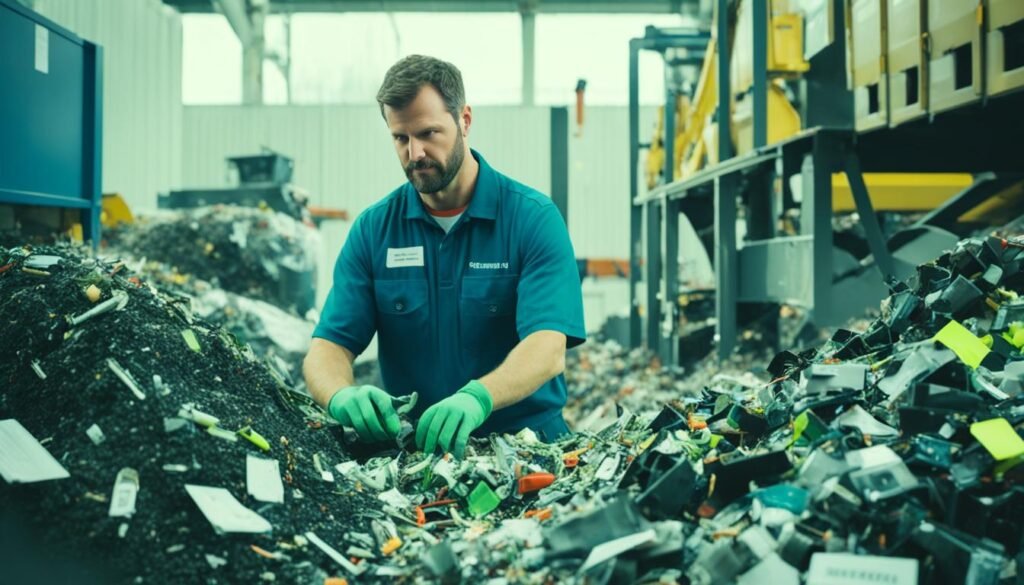By 2025, the World Bank predicts we’ll see 2.2 billion tonnes of solid waste globally. This huge number shows we must manage waste better now. Today, dealing with waste is crucial, but it’s tough to make real progress.
Funding, facilities, and awareness are big problems. When these are lacking, it’s hard to manage waste well and lessen its harm to our earth. And there’s a big issue with getting rid of dangerous and electronic waste correctly. It needs special methods and places.
Bad waste handling can hurt our environment and climate. This danger affects our planet’s future. To cut down our carbon footprint, we need new, smart waste systems that can change when needed.
Key Takeaways:
- Effective waste management is crucial to address the growing waste crisis.
- Lack of funds, infrastructure, and public awareness are major challenges in waste reduction.
- Proper disposal of hazardous and e-waste requires specialized techniques and facilities.
- Poor waste management practices contribute to environmental pollution and climate change.
- Innovative, sustainable, and adaptable waste management systems are necessary for a greener future.
The Importance of Time and Labor Efficiency in Waste Management
Waste management requires a lot of work and timely actions. Making sure everything runs on time is vital. If things like waste collection and sorting fall behind, it could have many bad effects. This includes not just more costs but also trouble with how well everything works.
Delays are common because there’s so much waste and many questions come up. These hold-ups can stop important tasks from getting done. What’s worse, they can lead to more waste piling up. This piles up problems, like harming our environment and causing health issues.
Inefficiency Breeds Bottlenecks
Delays in waste collection can happen for many reasons. These issues stop waste from being picked up and disposed of quickly. Dr. Emily Anderson from Green Solutions Inc notes these bottlenecks can disrupt the whole waste management system.
“Bottlenecks in waste management divert resources, hinder the effective utilization of manpower, and disrupt the overall flow of waste management operations,” says Dr. Emily Anderson, a waste management expert at Green Solutions Inc.
With already stretched systems, these problems get worse. Waste management can take up a big part of a city’s budget, around 20% yearly. This leaves less money for other important updates and practices.
Being quick and effective in managing waste cuts down on its buildup. This reduces environmental risks and uses resources better.
The Financial Cost of Inefficient Waste Management
Bad waste management is expensive. Beyond the direct costs, there are others that affect the economy. Think about health care costs from pollution and how inefficiency slows down work.
Getting better at managing time and work can reduce costs. This makes it possible to use money and resources where they’re needed most. Adopting smart ways to handle waste means governments can do more with their budgets.
| Impact | Potential Solutions | |
|---|---|---|
| Environmental impact of waste | Increased pollution, habitat destruction, and climate change. | Implement waste reduction techniques, promote recycling initiatives, and adopt sustainable waste solutions. |
| Healthcare costs | Illnesses caused by improper waste management. | Improve waste collection and disposal systems, enhance public awareness, and promote hygiene practices. |
| Lost productivity | Disruption of regular activities, hampering economic growth. | Invest in modern waste management technologies, streamline waste collection routes, and prioritize high-priority tasks. |
Efficient waste management is good for both the environment and community well-being. It also helps communities’ financial health.

Coping with Total Waste Generation
In 2018, the US produced 292.4 million tons of solid waste. Over half was dumped in landfills. This waste volume is set to grow due to more people and city living.
Landfills create methane, a harmful gas. This gas harms the environment and our health. It also speeds up climate change.
Handling more waste without hurting the planet is tough. But, we can manage by reducing waste, recycling, and disposing responsibly.
The Role of Recycling and Waste Reduction
Recycling and making less waste are key. They can cut our landfill dependence and lower emissions.
Effective recycling programs include homes and businesses. Composting and reusing products help too. So does turning waste into energy.
Educating people and companies is crucial. Awareness makes them practice sustainable waste handling. It encourages a culture of keeping the planet clean.
Innovative Technologies for Waste Management
New technologies provide hope in dealing with waste. They make trash collection smoother and help recover resources.
Smart systems with sensors improve collection and save fuel. They adapt to waste patterns, making management easier.
Some technologies turn organic waste into clean energy. This cuts fossil fuel use and greenhouse gases.
Adopting new tech helps cities manage waste better. It reduces landfill need and supports sustainability.

To deal with waste, we need several strategies. Recycling, reducing waste, and using new technologies are vital. These approaches lessen waste’s harmful effects, making for a healthier planet.
Solutions for Effective Waste Management
To improve waste management, we need community involvement, new tech, and insight into behaviors. Getting communities involved and well-informed on waste disposal makes a huge difference.
New technologies are changing the game in waste management. They make things easier and more effective. For example, smart bins separate recyclables and apps keep us updated on collection times.
Understanding why people treat waste the way they do is key. Once we know their views, we can guide them towards better practices.
There are success stories out there. Scottsdale, Arizona, has smart bins that teach people how to sort their trash. The University of British Columbia uses tech to cut down on waste and teach sustainable living.
